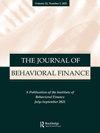独裁者如何使用收件人的信息
IF 1.7
3区 经济学
Q3 BUSINESS, FINANCE
引用次数: 1
摘要
摘要本文探讨了利他主义在多大程度上受到受益者显著特征的影响。我们研究了在独裁者游戏中,向发送者提供的信息如何影响他们对接收者的感知。在这种环境中,接受者的起始禀赋可以从接受者所做的选择中推断出来。独裁者给所有受助者的钱都是一样的,不管他们的选择是什么,尽管他们倾向于把更多的钱给那些开始时禀赋较低的受助者。当独裁者们被明确告知接受者一开始就有很高的禀赋时,他们就很少给予。然而,当独裁者只被告知接受者的选择表明他们一开始就有很高的禀赋时,独裁者不会接受这个信息。独裁者不会因为群体内偏见而对那些与自己做出类似财务选择的人更慷慨。我们的研究结果表明,慈善捐赠者会受到接受者显著信息的影响,不会试图在明确呈现的信息之外推断其价值。本文章由计算机程序翻译,如有差异,请以英文原文为准。
How Dictators Use Information about Recipients
Abstract This paper explores the extent to which altruism is influenced by the salient features of the beneficiaries. We investigate how information presented to senders affects their perception of the recipient in a dictator game. In this environment, the starting endowment of a recipient can be inferred from choices the recipient made. Dictators give the same amount to all recipients regardless of the choices they made, despite the revealed preference to send more money to recipients who started with lower endowments. Dictators give very little when they are explicitly told that a recipient started with a high endowment. However, when dictators are only told that the recipient made a choice that indicates they started with a high endowment, dictators do not incorporate that information. Dictators are not more generous to others who made a similar financial choice to themselves, through in-group bias. An implication from our results is that charitable donors are influenced by salient information about recipients and do not try to infer deservingness beyond what is explicitly presented.
求助全文
通过发布文献求助,成功后即可免费获取论文全文。
去求助
来源期刊

Journal of Behavioral Finance
Multiple-
CiteScore
4.60
自引率
10.50%
发文量
34
期刊介绍:
In Journal of Behavioral Finance , leaders in many fields are brought together to address the implications of current work on individual and group emotion, cognition, and action for the behavior of investment markets. They include specialists in personality, social, and clinical psychology; psychiatry; organizational behavior; accounting; marketing; sociology; anthropology; behavioral economics; finance; and the multidisciplinary study of judgment and decision making. The journal will foster debate among groups who have keen insights into the behavioral patterns of markets but have not historically published in the more traditional financial and economic journals. Further, it will stimulate new interdisciplinary research and theory that will build a body of knowledge about the psychological influences on investment market fluctuations. The most obvious benefit will be a new understanding of investment markets that can greatly improve investment decision making. Another benefit will be the opportunity for behavioral scientists to expand the scope of their studies via the use of the enormous databases that document behavior in investment markets.
 求助内容:
求助内容: 应助结果提醒方式:
应助结果提醒方式:


